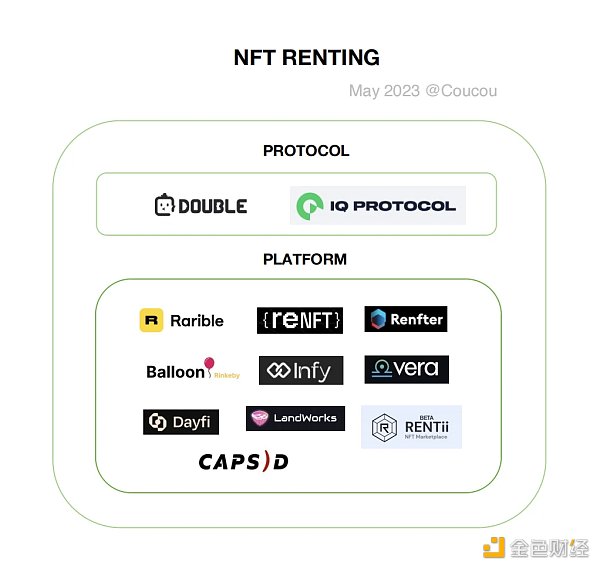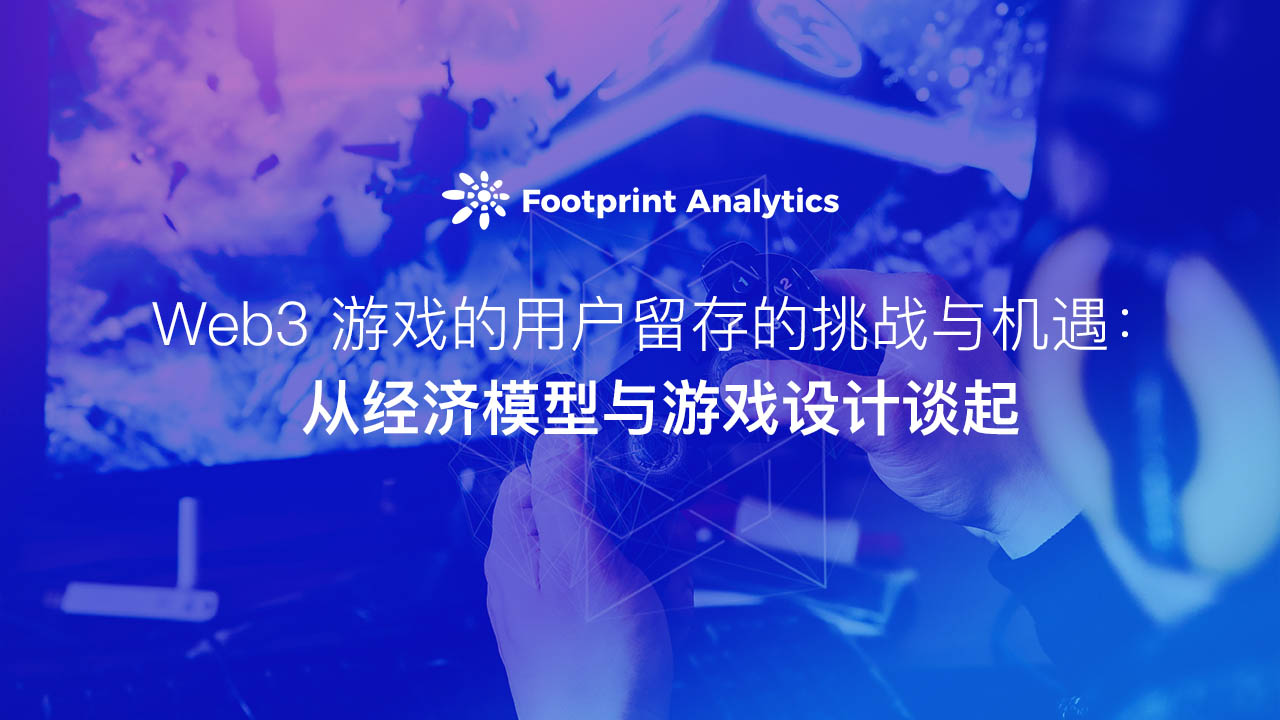Blockchain changes production relations? Big data is not ready to serve as a means of production
Text | Interlink Pulse · Golden Car
At a blockchain forum at the end of last year, Chen Weigang, supervisor of the Banking and Insurance Regulatory Commission, proposed that big data is the means of production, artificial intelligence is the productivity, and blockchain is the production relationship. This conclusion has been widely recognized by the scientific and technological community.
Big data, artificial intelligence, and blockchain are complementary and integrated development, but the current situation is that these three technologies are still taking their own paths. Although some domestic companies are starting to deploy "Blockchain + Big Data", they have always been "just hearing their voices and not seeing their people"; the other side has launched a number of "Blockchain + Big Data" applications abroad. Its development form is also not optimistic.
The combination of big data and blockchain, these two technologies has explored two different development paths at home and abroad, but it has not yet ushered in the opportunity for integration and development.
- Interview | Weizhong Bank Blockchain Security Scientist: Strictly adhere to the privacy data red line, business innovation compliance
- Research | Blockchain opens a new chapter in health
- Solana completes Dutch auction, raises $ 1.76 million
Domestic: Data Security and Interaction
When he spoke at "1024", he proposed "accelerating the deep integration of blockchain and cutting-edge information technologies such as artificial intelligence, big data, and the Internet of Things to promote integrated innovation and convergence applications." The combination of blockchain and big data It is imperative. Prior to this, scholars and industry professionals have put forward more ideas for the combination of blockchain and big data. On HowNet, there are more than 100 papers on blockchain and big data.
Taken as a whole, blockchain is used in the field of big data and mainly plays a role in four aspects:
1. Data sovereignty: use blockchain technology to confirm the data, solve the problem of the actual ownership of big data, and protect data privacy;
2. Data security: Through the application of blockchain, avoid the problem of sensitive data being easily tampered with in a centralized data solution, ensure data security, integrity, and authenticity, and improve the quality of data in big data systems;
3. Data interaction: Use blockchain technology to ensure mutual trust is achieved to promote data sharing and avoid repeated analysis of data and data islanding in the process of big data processing;
4. Data transactions: Based on the blockchain's incentive mechanism, individuals and small institutions can use the form of tokens to conduct point-to-point data transactions.
The domestic "blockchain + big data" project is based on two scenarios: data security and data interaction. Its project is mainly aimed at enterprises, and aims to ensure data security and promote mutual trust to facilitate data interaction.
For example, the UD digital chain open source project, a blockchain big data encryption computing platform that was launched in China in November 2018, uses blockchain technology to enable participating parties to protect their own proprietary data and protect user privacy. To eliminate data barriers and achieve secure and legal circulation of data.
It is reported that the project was initiated by Fushu Technology, a big data intelligent service provider, and was subsequently recognized by enterprises and institutions such as Mining Money, Youb MobData, Shenzhou Taiyue, Qianlong Technology, Data Huitong, Zhejiang Big Data Trading Center, And become the founding node unit. The project is constructed in a cross-company manner. Each contributing unit has only one node, and there is no single company control. The project has previously landed in the financial industry's risk control data circulation and user portrait joint modeling.
In the field of risk control in the financial industry, "blockchain + big data" is indeed useful. A domestic team once proposed a similar solution, combining blockchain with big data risk control to solve the problem of data silos in big data risk control, improve the problem of poor quality of big data risk control data, and prevent data leakage.
In addition to the financial field, the application of blockchain and big data in government affairs and education has also attracted more attention.
A few days ago, in the article "Using emergency policies to optimize the business environment" published by the Economic Daily, it was proposed that all departments should use blockchain technology to establish a government affairs big data service system, and form an intelligent system for open information sharing and government approval. Promote the optimization and reconstruction of the business environment for government affairs. Jinan City has also proposed a "Blockchain + Educational Big Data" platform solution.
In addition, in the recent answer to investors' questions, Shuzhi Technology also stated that since 2015, the company has carried out technology research and development in blockchain-related industries for numerical alliance chains, smart investment advisory, and self-regulated smart contracts. The construction of the big data platform of blockchain technology, and actively expanding the application of credit, environmental protection, smart cities and other fields.
Xinguodu also said that in the current blockchain technology and research direction, the company mainly focuses on the technology integration of blockchain technology + big data.
However, when Interchain Pulse further searched the above platforms and studies, there was no more detailed disclosure.
Foreign: Data Sovereignty and Transactions
In previous years, the international team has also carried out corresponding research and practice. Among them, the more representative projects are Streamr, Fysical, ReBloc, Endor Protocol. These projects are mostly designed to use blockchain to protect users' data sovereignty, thereby promoting data transactions between users.
For example, Streamr proposed that in the big data industry, data ownership is mostly in the hands of Google, Amazon, Baidu, Alibaba, Tencent and other large companies. They have a large amount of user data, but the data is not external. Small companies and scientific research institutions that have been excluded cannot obtain data; at the same time, some small data masters can produce data, but because the value of the data is relatively low, it is impossible to find buyers. There is no direct communication between the two.
In response, the Streamr team launched a decentralized open source network for individuals in 2017. Streamr allows users to sell various real-time data products. Data buyers can use the token DATA to directly trade with the seller. All data in the market can be delivered point-to-point through the Streamr network, thereby eliminating traditional middlemen and fees.
Interlink pulse observations. At present, the data products on the Streamr website involve a wide range of fields and types, including population density data in New York, air quality data in Nantes, and fitness data. At the same time, data are free and paid.
(Data products traded on Streamr)
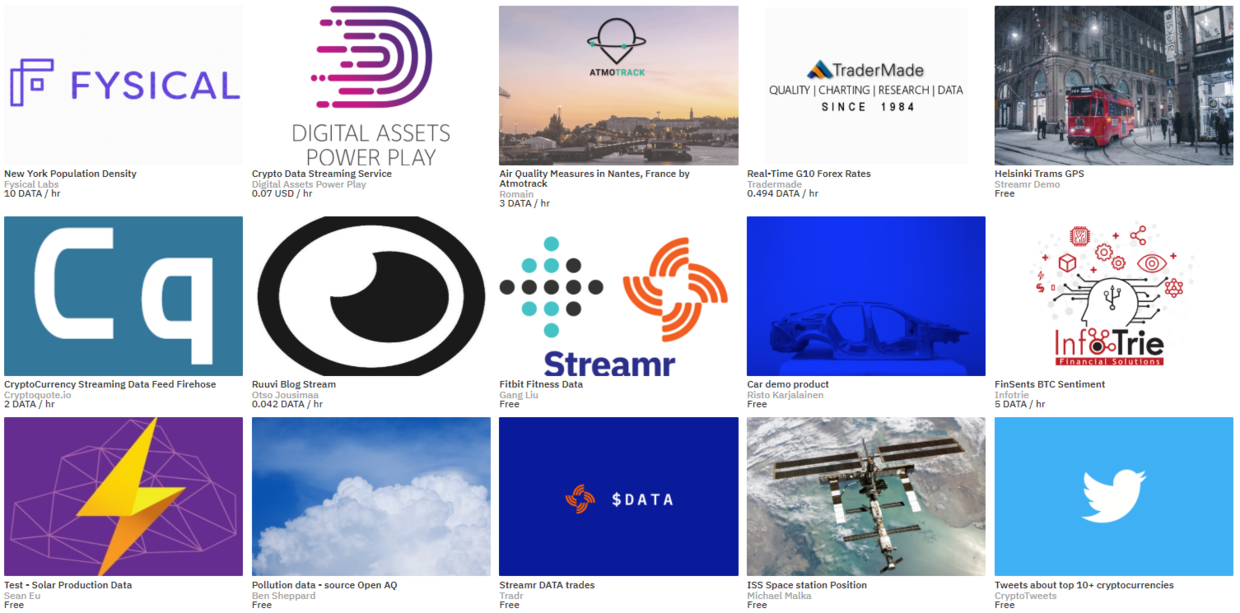
Compared to Streamr, the Fysical and ReBloc projects are aimed at a more segmented data market. Fysical is a distributed location data market. The data information traded through the blockchain network is mainly the location and movement of people; ReBloc is a real estate data network based on blockchain technology.
These two platforms also allow users to tokenize data and retain control and ownership of the data, while buyers can obtain cheaper and more reliable data through the platform.
Unlike the above three projects, the Endor Protocol automatic prediction engine focuses on artificial intelligence technology. The project uses blockchain infrastructure and Endor's proprietary social physics technology, and uses artificial intelligence to analyze big data to accurately find customer behavior patterns, thereby providing individuals and businesses with fast, accurate and intelligent business decisions.
The role of blockchain in Endor, on the one hand, is to ensure the security of private data during transmission and storage; on the other hand, it still facilitates data transactions, and platform users can purchase predictions with the help of token EDR.
To sum up, most of the foreign "blockchain + big data" projects are for individuals and small institutions, and on the basis of protecting user data sovereignty, they use incentive models to promote data transactions. Observing its official website, these four projects have already achieved practical application cases.
However, if we look at their respective tokens, the development of the four projects mentioned above does not seem optimistic.
Non-small data shows that Streamr's token DATA has increased during the year, but overall it still fell by 22.8%; Endor Protocol's token EDR has decreased by 99.02% compared to the time of issue; Coincodex platform data shows that since 2019 Since October, the price of Fysical's currency has returned to zero. And this is because foreign "blockchain + big data" applications are mainly targeted at individual and small institutional users, and are targeted at segmented scenarios. The value of data produced by small data masters is relatively low, and the demand for subdivided data fields is also relatively limited.
(Data source: non-small)
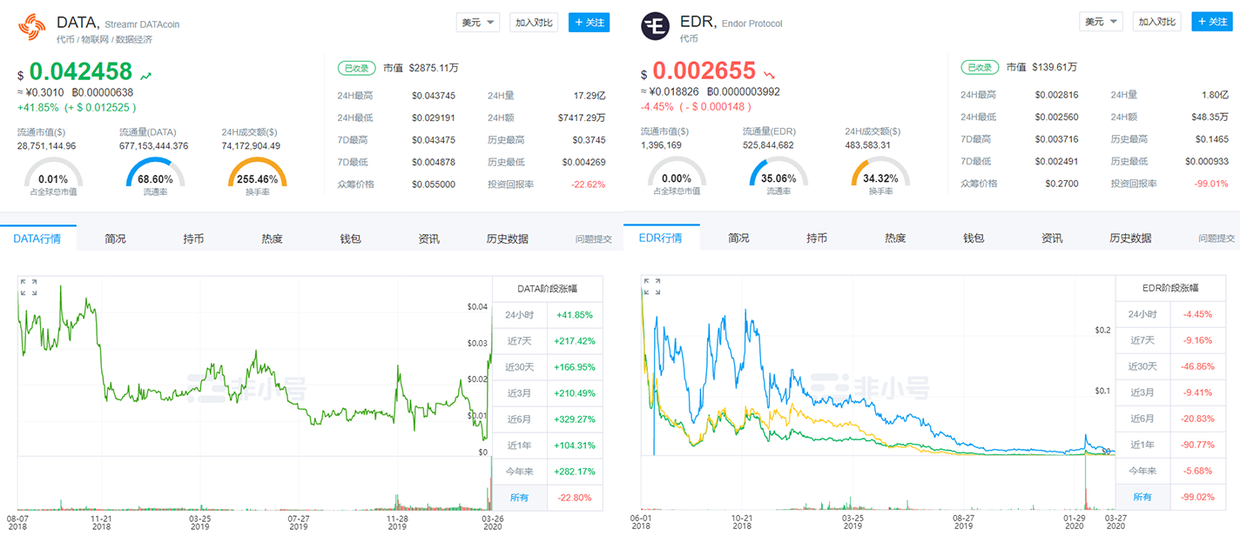
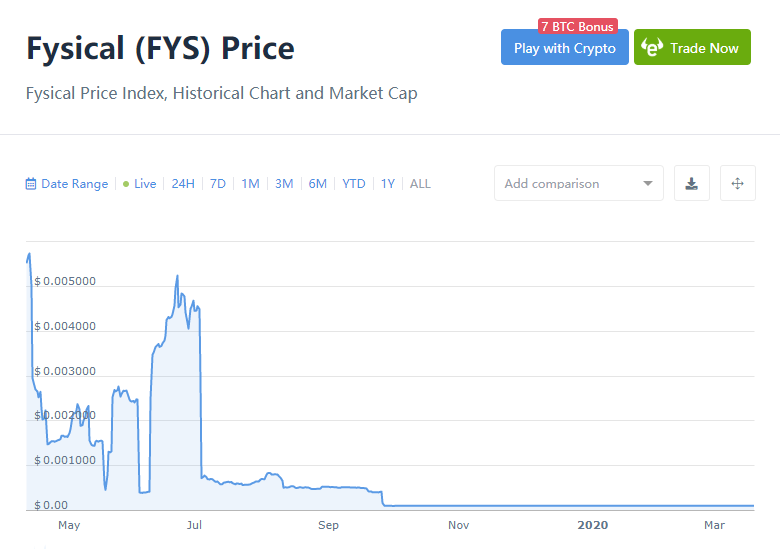
(Data source: Coincodex)
The era of "blockchain + big data" has not yet arrived
From this perspective, it seems that the domestic and foreign "blockchain + big data" platform construction has not yet ushered in real development opportunities. This is mainly because the blockchain has landed in the field of big data, which is immature in terms of cognition, technology, and standards.
The first is the cognitive level. Based on the public's awareness of the blockchain, the trust of the blockchain is still small, and it has not yet been possible to achieve large-scale trust. The amount of data that can be chained is still small, which is not comparable to the massive data required for big data analysis.
The second is the technical level. Blockchain technology is still immature. For example, homogeneous encryption to protect data privacy, zero-knowledge proofs and other computing technologies are still immature. Blockchain is used in the data trading market, and it is still mainly token trading, which has not formed a large-scale market for value data transactions.
Third, at the standard level, the field of big data actually requires more standardized management to meet the data specifications of various industries and fields. However, there is still no clear standard on what kind of data can be uploaded and should be uploaded.
"Blockchain + Big Data" projects at home and abroad are still slowly exploring. But also made useful explorations and attempts at this stage.
This article is the original [Interlink Pulse], the original link: https://www.hulianmaibo.com/posts/info/42973 , please indicate the source when reproduced!
We will continue to update Blocking; if you have any questions or suggestions, please contact us!
Was this article helpful?
93 out of 132 found this helpful
Related articles
- Blockchain application goes to the next city Shanghai court pilots blockchain technology
- How to invest in half? Where do companies go public? Where is the capital? Blockchain First Trader Decrypts For You | Babbitt Industry Lesson
- Smart contract backdoor unveiled: It's not just hackers who steal money, the "one-click coin" platform has hidden backdoors
- Research | How does blockchain technology empower digital agriculture?
- Introduction | Blockchain Project Financing Tool: SAFT
- Blockchain Industry Weekly Report | Ministry of Industry and Information Technology: Guiding the Platform to Enhance New Technology Support Capabilities
- Smart contracts eliminate information asymmetry, build trust, and upend traditional insurance models

